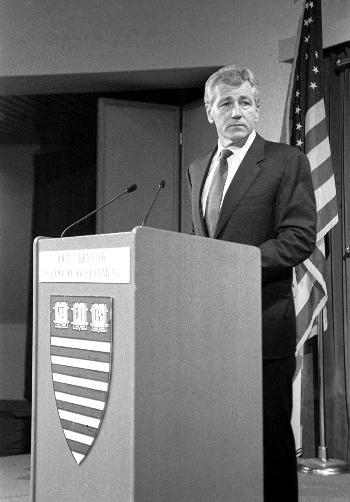
News
Pro-Palestine Encampment Represents First Major Test for Harvard President Alan Garber

News
Israeli PM Benjamin Netanyahu Condemns Antisemitism at U.S. Colleges Amid Encampment at Harvard

News
‘A Joke’: Nikole Hannah-Jones Says Harvard Should Spend More on Legacy of Slavery Initiative

News
Massachusetts ACLU Demands Harvard Reinstate PSC in Letter

News
LIVE UPDATES: Pro-Palestine Protesters Begin Encampment in Harvard Yard
Senator Criticizes Past Foreign Policy

U.S. Sen. Chuck Hagel (R.-Neb.) spoke last night at the Kennedy School of Government about America’s response to “the most important challenge to our nation since World War Two,” criticizing a foreign policy he called one of ignorant bliss and encouraging more multilateralism and trade around the globe.
A decorated Vietnam veteran, Hagel was first elected to the Senate in 1996, and is now the ranking member of the Subcommittee on East Asian and Pacific Affairs within the Foreign Relations Committee.
After joking around for a few minutes about his summer interns and poking fun at his state, Hagel turned serious last night.
“All the world is engaged in a struggle against this evil of terrorism,” he said. “Bin Laden and his followers do not represent a culture—they work to destroy culture.”
Hagel said that bin Laden and people like him fear America becuse “we respect everyone’s right to pray to a god in whom he believes.”
A ranking member on the Subcommittee on International Trade and Finance within the Senate Banking Committee, Hagel said he considers trade and a strong economy central to helping win the hearts of Third World nations.
He also mentioned that human rights should not be such a high priority, saying, “The world does not work as all mini-Americas.”
Hagel promoted new international coalitions, such as the one President Bush is currently working on, as the best way to keep the world informed of the common threat of terrorism.
“Stopping terrorism isn’t the only purpose,” he said. “It’s the catalyst of the begining of a new world order.”
The speech, titled “The World—Redefined,” put forth three stages the world must go through in battling terrorism.
First, Hagel talked of a “protect and prevent stage”—what the U.S. is experiencing now. Second, said Hagel, comes the “interconnect stage”—when the U.S. works to bring the world’s people closer together.
“All six billion people living on the face of the earth are connected” through technology, the environment, communication, immigration and trade, Hagel said.
The senator mentioned Harry S Truman when he spoke of the need for “new, visionary leaders.”
But he emphasized that national sovereignty should not be compromised anywhere in the world.
“In dealing with our relationships with Russia, China, and Europe, we have been making policies in a vacuum,” he said, mentioning that the U.S. currently has a record number of unilateral economic sanctions. “Recently, we’ve been undoing those because we need each other for mutual self-interest.”
Hagel even mentioned Iran and Libya as countries against whom America needs to consider dropping sanctions. In the future, Hagel said, Bush needs the backing of Congress to renegotiate trade agreements, which would lead to “social bridges.”
Hagel encouraged new peace negotiations in the Middle East, saying that the current state of affairs is “the most dangerous situation [there] since 1973.” He said he feels a Palestinian state must be part of the peace agreement.
Hagel also confronted directly the idea of nation-building.
“Make no mistake,” he said. “We need to negotiate a new government to replace the Taliban.”
Want to keep up with breaking news? Subscribe to our email newsletter.
